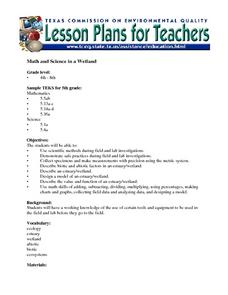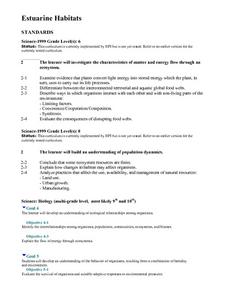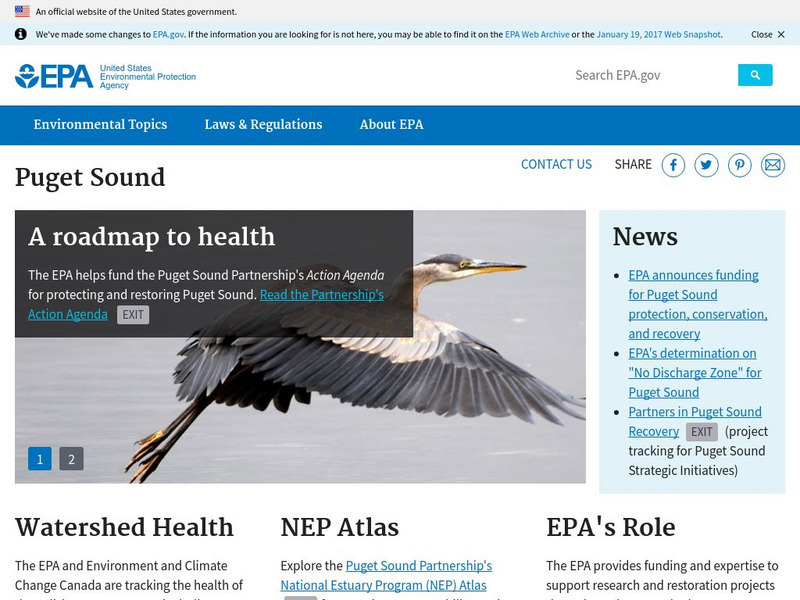Curated OER
Coastal Biodiversity
In this earth science worksheet, learners identify and locate vocabulary terms related to coastal biodiversity. There are 22 words located in the puzzle.
Curated OER
Finding the Salt Front
Students discuss definitions of estuary, salinity, and the salt front. They listen as the teacher explains the Hudson River Miles and ways the upriver and downriver sections relate to the north and south. Students graph the salt front...
Curated OER
What You Can Do For the Tijuana Estuary
Students discuss how they can be involved in the protection of the Tijuana estuary. In groups, they develop a brochure to share with their community what they can do to save the estuary. They share them with the class and hand them out...
Curated OER
Math and Science in a Wetland
Students describe safe practice when doing field and lab investigations in a estuary or wetland. They create a model of an estuary and describe their value and function. They participate in field study in which they collect and analyze...
Curated OER
Estuarine Habitats
Sixth graders study the important habitats, flora, fauna, and physical factors of coastal habitats. They compare the aquatic habitats to terrestrial habitats by researching and completing tables with the information.
Curated OER
What is an Estuary?
Young scholars define the terms estuary and watershed. They conduct an experiment to determine the density differences between fresh and saltwater. They examine the salinity distribution of the Peconic Bay Estuary.
Curated OER
New Jersey Estuaries
Students observe a stream table activity to realize how an estuary protects the mainland from floodwaters. They predict what will happen, then draw and write up the results.
Curated OER
Beaches of the Delaware Estuary
Students examine estuaries in Delaware. They, in groups, gather samples of water to find organisms and identify them.
Curated OER
Texas Estuary Project
Students practice the proper lab techniques of coring, seining, taking temperatures, and salinity. Students analyze and graph data. Students write a 3 part essay and correctly draw and label a food web of their field site.
Tramline
Tramline: Salt Marshes Field Trip
Travel with your students on a virtual field trip to learn about saltwater marshes!
University of Florida
Florida Museum of Natural History: About the Florida Everglades
Everything you always wanted to know about the Everglades! The Florida Museum of Natural History offers great photos and good information on the many habitat types to be found there.
Science Buddies
Science Buddies: Can Water Float on Water?
Of course it can, you say: ice is water and ice floats. And you're right. But we're talking about water in the liquid phase Can liquid water float on water? The goal of this project is to investigate what happens to layers of water with...
American Institute of Biological Sciences
Action Bioscience: The Value of Healthy Estuaries
An article featuring the complexity of estuaries which highlight the value these systems have to human and wild life.
Canadian Wildlife Federation
Hinterland Who's Who: Estuaries
Learn about estuaries, where the fresh water rivers meet the salt water of the oceans. The unique features of estuaries are explained, followed by a look into estuarine food webs. Next find out about the different plants and animals that...
Encyclopedia of Earth
Encyclopedia of Earth: Botany: Mangrove Ecology
Extensive article on mangroves. Covers classification, physical characteristics, life cycle, habitat, economic value, and natural and human threats to their survival.
Encyclopedia of Earth
Encyclopedia of Earth: Ocean Oil: Coastal Ecosystems
A collection of articles, video, and some teaching guides on issues related to coastal ecosystems. Includes environmental issues, e.g., oil spills, and different types of ecosystems, e.g., mangroves and coastal grasslands.
Other
Marine Grafics: Estuary Live
This resource presents a virtual, but interactive field trip for students in grades 4-12. General info on estuaries and on the program that allows students to study the North Carolina estuaries. Correlated to NC Standard Course of Study...
Other
Epa New England: Long Island Sound Facts, Figures, and Maps
Listing of various fact sheets created and published through the Long Island Sound Study. Topics include How Low Dissolved Oxygen Conditions Affect Marine Life in LI, Impact of Atmospheric Nitrogen Deposition on Long Island Sound, Sound...
National Geographic
National Geographic: Programs: Chesapeake Bay Water Quality Project
A project-based collaborative unit of study that teaches students about watershed health using real-time geospatial technology. Students engage in outdoor field experiences while using twenty-first century learning skills.
Other
Niwa: Estuaries
Want to understand the ecosystem of the estuaries or learn how estuaries are formed? This site contains information about estuaries to help you answer the questions above and more. Learn about the types of estuaries, their ecological and...
US Environmental Protection Agency
Epa: Puget Sound
Learn facts about this important and diverse ecosystem in America's Pacific Northwest.
NOAA
Noaa: Estuaries: Noaa: Science Data: Graphing
Create graphs of marine ecosystems using real-time data.
NOAA
Noaa: Estuaries: Noaa: Teachers: Middle School
This resource provides a middle school curriculum on the topic of estuaries. Includes a PDF (requires Adobe Reader).
NOAA
Noaa: Estuaries 101 Curriculum: Estuary Food Pyramid
Students learn about the feeding relationships in an estuary ecosystem with this interactive energy pyramid activity. A second activity involves research and a video clip to elaborate the learning.

























